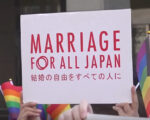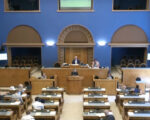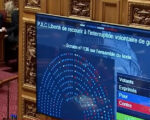>> Appeals Court Strikes Down Wisconsin, Indiana Gay Marriage Bans As Unconstitutional
La cour d’appel fédérale de Chicago vient de condamner ce jeudi l’interdiction du mariage pour les couples homosexuels, actuellement en vigueur dans les États du Wisconsin et de l’Indiana. Mais cette décision ne devrait pas s’appliquer avant le débat que devrait engager La Cour suprême sur la question, lors de ses sessions d’octobre à juin prochain.
“C’est totalement invraisemblable (…)” a déclaré le juge Richard Posner, magistrat républicain, balayant dans sa décision les arguments présentés par les représentants des deux Etats : “Des couples hétérosexuels se saoulent et la femme tombe enceinte, ce qui aboutit à des enfants non désirés : on les récompense en les autorisant à se marier. Les couples homosexuels n’ont pas d’enfants non désirés : on les récompense en leur interdisant le droit de se marier. Allez comprendre ?!”
Sur le fond, l’arrêt de la cour d’appel, prise à l’unanimité par les trois juges, estime que l’interdiction des “mariages homosexuels” en vigueur dans l’Indiana et dans le Wisconsin enfreint le droit garanti par la Constitution à une égalité de protection des citoyens devant la loi. Mais cette décision ne devrait pas s’appliquer avant le débat que devrait engager La Cour suprême sur la question, lors de ses sessions d’octobre à juin prochains.
Deux autres cours d’appel fédérales ont rendu des décisions similaires concernant la Virginie, l’Utah et l’Oklahoma.
Mais, en Louisiane, ce mercredi 3 septembre justement, le juge Martin Feldman, un fondamentaliste, a pour sa part déterminé que l’amendement pour interdire l’égalité des droits du mariage aux conjoints homosexuels n’enfreignait pas la constitution, puisque déjà approuvée par 78 pour cent des électeurs. Et qu’il était naturel que l’État préserve “les familles” et les liens entre les enfants et leurs parents biologiques. “Je laisse à d’autres Cours, le soin d’annuler ou pas ma décision”.
Histoire de ralentir la marche ou de surcharger encore le système ?
Le mariage pour tous est déjà légal dans 19 des 50 États du pays ainsi que dans le district fédéral de Washington DC. La suite avec La Cour Suprême.
Terrence Katchadourian
@stop_homophobie
[mp_row]
[mp_span col=”12″]
[mp_code margin=”none,none,none,none”]
[/mp_code]
[/mp_span]
[/mp_row]
[mp_row]
[mp_span col=”12″]
[mp_code margin=”none,none,none,none”]
>> A U.S. appeals court issued a scathing, unequivocal ruling Thursday declaring that gay marriage bans in Wisconsin and Indiana were unconstitutional, on the same day that 32 states asked the Supreme Court to settle the issue once and for all.
The U.S. 7th Circuit Court of Appeals in Chicago was the fourth to hear arguments on the issue. The decision from a normally slow and deliberative court was released a little more than a week after oral arguments.
The unanimous, 40-page decision from a three-judge panel blasted the states’ justifications for their bans, several times singling out the argument that only marriage between a man and a woman should be allowed because it’s — simply — tradition.
There are “bad traditions that are historical realities such as cannibalism, foot-binding, and suttee, and traditions that … are neither good nor bad — such as trick-or-treating on Halloween,” the ruling says. “Tradition per se therefore cannot be a lawful ground for discrimination — regardless of the age of the tradition.”
It also laid into another argument from the states that gays should not be allowed to marry because, on their own, they can’t procreate, saying that rationale “is so full of holes that it cannot be taken seriously.”
Wisconsin Attorney General General J.B. Van Hollen said he would appeal the ruling to the U.S. Supreme Court.
Also Thursday, Massachusetts and 14 other states where same-sex marriage is legal filed a brief asking the justices to overturn other states’ bans on gay marriage. Meanwhile, Colorado and 16 other states that have banned same-sex marriage filed a separate brief asking the court to rule one way or the other to clear up a “morass” of lawsuits.
Since last year, the vast majority of federal rulings have declared same-sex marriage bans unconstitutional. Supreme Court justices typically take up issues only when lower courts disagree. But in this case, states are asking the court to settle the issue nationwide once and for all.
The Wisconsin and Indiana cases shifted to Chicago after the states appealed lower court rulings tossing the bans.
The court’s decision won’t take effect for at least 21 days, said Camilla Taylor, a lawyer for Lambda Legal who argued on behalf of Wisconsin plaintiffs. That should give the states time to ask the Supreme Court to put it on hold, she said.
Between the bans being struck down and a 7th Circuit order reinstating them as the appeals process ran its course, hundreds of gay couple in both states rushed to marry.
Gay couples heralded Thursday’s decision.
“I have hope that we’re going to be able to live in Wisconsin with full equality, that we won’t be considered second-class citizens,” said Roy Badger, of Milwaukee, who sued with partner Garth Wangemann to overturn Wisconsin’s same-sex marriage ban.
In Indiana, some couples gathered at an office of the American Civil Liberties Union — whose lawyers represented many of the plaintiffs — after they received an email from one attorney proclaiming, “WE WON!!!”
But other people were unhappy.
“Marriage policy should be about protecting the established needs of children and society, not affirming the variable desires of certain political activists,” said Micah Clark, executive director of the American Family Association of Indiana.
The decision came unusually fast for the 7th Circuit — just nine days after oral arguments. The court typically takes months on rulings.
Judge Richard Posner, an appointee of Republican President Ronald Reagan, wrote the opinion. During oral arguments, Posner fired tough questions at the bans’ defenders, often expressing exasperation at their answers.
The other two judges on the panel were 2009 Barack Obama appointee David Hamilton and 1999 Bill Clinton appointee Ann Claire Williams.
The ruling echoed Posner’s comments during oral arguments that “hate” underpinned the bans.
The opinion repeatedly mentions the issue of tradition, noting that some, such as shaking hands, may “seem silly” but “are at least harmless.” That’s not the case with gay-marriage bans, the court said.
“If no social benefit is conferred by a tradition and it is written into law and it discriminates against a number of people and does them harm beyond just offending them, it is not just a harmless anachronism; it is a violation of the equal protection clause,” the opinion says.
A constitutional amendment approved in 2006 by voters banned gay marriage in Wisconsin, while state law prohibited it in Indiana.
The next appeals court to take up the question will be the San Francisco-based 9th Circuit, which will hear arguments Monday on gay marriage bans in Idaho, Nevada and Hawaii.
U.S. District Court Judge Martin Feldman’s ruling makes him the first federal judge to uphold a state’s ban on same-sex marriage after the Supreme Court’s landmark ruling striking down a key provision of the Defense of Marriage Act in June 2013 through its decision in Windsor v. U.S.
Unlike every other federal judge who has considered the issue in the past year, Feldman determined that Louisiana’s ban on same-sex marriage — approved by 78 percent of voters as a 2004 constitutional amendment — is rationally related to the state’s “legitimate interest” in “linking children to an intact family formed by their two biological parents,” according to the ruling.
BuzzFeed notes that Feldman’s decision seems aware of its peculiar place in recent judicial history, while also acknowledging that this decision, from the U.S. District Court for the Eastern District of Louisiana, is nowhere near the final verdict on marriage equality in Louisiana or nationwide.
“Many other courts will have an opportunity to take up the issue of same-sex marriage,” Feldman writes, including “courts of appeals and, at some point, the U.S. Supreme Court. The decision of this Court is but one studied decision among many.”
[/mp_code]
[/mp_span]
[/mp_row]

















